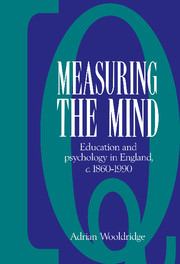Book contents
- Frontmatter
- Contents
- Acknowledgements
- List of abbreviations
- 1 Introduction
- 2 Studying childhood
- 3 The invention of educational psychology
- 4 Cyril Burt and the psychology of individual differences
- 5 Susan Isaacs and the psychology of child development
- 6 The structure and status of a profession
- 7 Mental measurement and the meritocratic ideal
- 8 The psychometric perspective
- 9 Psychologists as policy makers, 1924–1944
- 10 The measurement of merit anatomised
- 11 Equality and community versus merit
- 12 Egalitarianism triumphant
- 13 Cyril Burt and the politics of an academic reputation
- 14 Equality and human nature
- 15 The measurement of merit revived?
- 16 Conclusion
- Glossary
- Selective bibliography
- Index
12 - Egalitarianism triumphant
Published online by Cambridge University Press: 11 March 2010
- Frontmatter
- Contents
- Acknowledgements
- List of abbreviations
- 1 Introduction
- 2 Studying childhood
- 3 The invention of educational psychology
- 4 Cyril Burt and the psychology of individual differences
- 5 Susan Isaacs and the psychology of child development
- 6 The structure and status of a profession
- 7 Mental measurement and the meritocratic ideal
- 8 The psychometric perspective
- 9 Psychologists as policy makers, 1924–1944
- 10 The measurement of merit anatomised
- 11 Equality and community versus merit
- 12 Egalitarianism triumphant
- 13 Cyril Burt and the politics of an academic reputation
- 14 Equality and human nature
- 15 The measurement of merit revived?
- 16 Conclusion
- Glossary
- Selective bibliography
- Index
Summary
For a time it looked as if the 1964 Labour government would ignore these siren voices and consummate the love-affair between the left and the meritocracy. Harold Wilson was an archetypical scholarship boy: the son of a self-educated textile chemist, he climbed the educational ladder from his local council school, via grammar schools, to Oxford, won a clutch of university prizes, including the Gladstone Memorial Prize, took an outstanding first in PPE (local legend has it that he got alphas on all his papers except moral philosophy), obtained a research fellowship on graduation, and became President of the Board of Trade before his thirtieth birthday. Many commentators in the mid-1960s presented the conflict between Labour under Wilson and the Conservatives under Alec Douglas-Home as nothing less than a conflict between a scientific meritocracy and a snobbish and ignorant old-boy network. The choice confronting the electorate was simple: amateurism and decline with the fourteenth Earl of Hume or expertise and modernisation with the fourteenth Mr Wilson. Wilson did his best to cash in on this mood, emphasising his humble origins and plain tastes, preaching the importance of self-help and technical know-how, pooh-poohing aristocratic pretension and social snobbery, and presenting politics as a struggle between gentlemen and players. He made the point brilliantly in his speech to the 1963 Party Conference: ‘For the commanding heights of British industry to be controlled today by men whose only claim is their aristocratic connection or the power of inherited wealth or speculative finance is as irrelevant to the twentieth century as would be the continued purchase of commissions in the armed forces by lordly amateurs.’
- Type
- Chapter
- Information
- Measuring the MindEducation and Psychology in England c.1860–c.1990, pp. 319 - 339Publisher: Cambridge University PressPrint publication year: 1994



